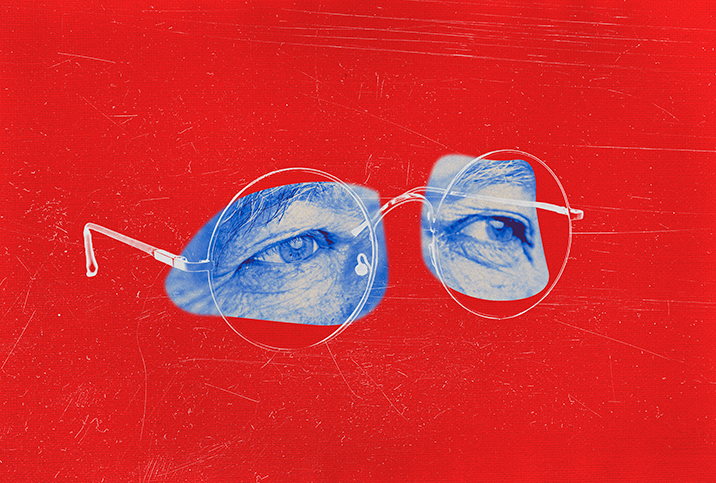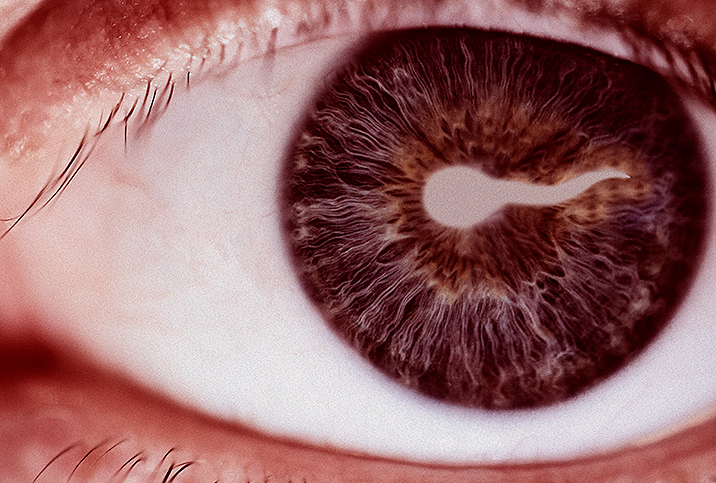Can Sex Make You Blind?

Adolescent sex education is clouded with myths that might deter young people from becoming sexually active, and perhaps one of the most ubiquitous is that masturbation and sex can make you blind. While most of these myths are outright falsehoods, this one holds some measure of truth.
The idea that masturbation makes you blind isn't entirely incorrect. Unlike the "masturbation will make you blind" assertion, sex-induced blindness is rare and not at all certain. It is also temporary, with recorded cases lasting one to two minutes or up to half an hour before resolving on their own.
Jerry Tsong, M.D., an ophthalmologist and retinal specialist at Greenwich Ophthalmology Associates in Stamford, Connecticut, warned that this bizarre phenomenon, though rare, does happen.
"I think it's worth being aware that this can happen, and if one experiences it, to recognize it and keep calm," he said.
Sex-induced temporary blindness
Temporary blindness can happen after sex because of changes in blood pressure and blood supply of the optic nerve. The mechanism is similar to what happens to blood pressure during exercise.
"Sex and orgasm releases catecholamines, hormones including adrenaline and noradrenaline. This typically causes constriction of blood vessels, which ordinarily would not be a problem," Tsong explained. "However, some people's blood vessels are more sensitive to these chemical signals and will temporarily constrict them in a process called vasospasm."
During vasospasm, sudden constriction of the main blood supply to the eye severely limits the blood flow to the eye, causing temporary blindness.
Fortunately, the minutes-long experience has no lasting effects on vision, with full vision always returning. But Tsong emphasized it's still important to consult your primary care doctor and eye doctor to rule out underlying medical problems, because restricted blood flow to the eyes isn't the only way sex can cause blindness. Sex can strip you of your most powerful sense in multiple ways, and they aren't all harmless or fleeting, so ruling out other causes is essential.
The serious ways sex can affect vision
From minor inflammation to losing your retina, sexually transmitted infections (STIs) have a range of implications for eye health and sight.
Most STIs affecting vision spread to the eyes when you touch them after touching genital secretions or getting genital secretions directly in contact with the eyes.
Though the impact of chlamydia in the eyes is relatively mild, symptoms can last weeks or months and include redness, mucous discharge, swollen eyelids, blurriness and crusting. The unpleasant symptoms may go untreated if the infection is mistaken for pink eye, for example, because unlike pink eye, chlamydia conjunctivitis does not improve with antibiotic eye drops.
Gonorrhea can cause hyperacute conjunctivitis (a more severe infection than chlamydia), which manifests as severe redness, eyelid swelling, tenderness and significant discharge. Gonorrhea in the eyes is treatable with antibiotics.
The effects of herpes on the eyes vary from minor conjunctivitis to infections of deeper layers of the eye.
"The degree of damage depends on the part of the eye that is affected and whether the patient is immunocompromised or not," said Nitasha Khanna, M.D., a cataract, LASIK and cornea surgeon, and external disease and refractive specialist in Massachusetts.
Vision-threatening conditions such as uveitis (infection of the middle layer of the eye) and retinitis (infection of the back wall of the eye) can develop from a herpes infection and cause permanent blindness. Retinitis can cause the retina to detach from the back wall of the eye, rendering it unable to function. Tsong warned that herpes infections in the eye, even after proper treatment, can leave significant scarring which results in permanent vision loss.
Pubic lice, unlike chlamydia, gonorrhea and herpes, don't require direct contact with the genitals to reach the eyes. The lice can jump onto the eyelashes during oral sex, causing itchiness, irritation and eye redness.
"Typically, this is diagnosed by ophthalmologists who use their microscope to detect and see the lice and eggs," Tsong said.
The lice and eggs are manually removed, and medicated ointments are used to treat the area.
Syphilis also doesn't require direct contact with the eyes to affect them. Syphilis is a systemic disease infecting the whole body and can reach the eyes easily. Tsong explained that syphilis can sometimes present solely as eye problems, with patients feeling very healthy otherwise.
"Sometimes eye doctors can diagnose syphilis based on clues from the eye exam and subsequent bloodwork to confirm the diagnosis," he said.
Like herpes, syphilis can also affect all layers of the eyes and, if left untreated, can cause severe vision loss and blindness. Syphilis usually presents as acute red eye, eye pain and sensitivity to bright light.
What to do if you test positive
Khanna said the best thing to do is to have an evaluation by an ophthalmologist, especially if you're experiencing changes to your eyes such as pain, light sensitivity, flashes or floaters (black- or gray-colored specks that drift around your vision).
"A complete exam of both eyes will reveal any changes," she added, emphasizing that it is never too early for an exam, and you might be surprised by how much can be detected from a routine eye exam.
"Sometimes STI-related eye infections can be caught before a patient is having visual symptoms," she said.
Khanna added that numerous conditions lack symptoms until it's too late.
"Many eye conditions are silent. An annual routine exam is invaluable," she stressed.
All of these conditions have effective treatment options. Tsong said the biggest challenge is to have your concerns heard and be comfortable explaining your sexual history and asking for help.
ED medication and sight
Erectile dysfunction (ED) medication can also lead to vision loss because of the way it works. As phosphodiesterase type 5 (PDE5) inhibitors, ED medication relaxes the smooth muscle lining the blood vessels, allowing easier engorgement of the penis when aroused.
This relaxing effect on the blood vessels is a whole-body reaction and not limited to the erectile tissue. Low blood pressure at night, induced by PDE5 inhibitors, has been linked to nonarteritic anterior ischemic optic neuropathy (NAION). A recent study found men who took 100-milligram tablets of ED medication had an increased risk of vision problems, including blue-tinted vision, color blindness and general blurriness.
"This disease is from lack of blood flow to the optic nerve, the nerve connecting the eye to the brain," Tsong explained. "Guys usually wake up in the morning and complain of painless vision loss in one eye."
Painless, however, does not mean harmless in this case. NAION can cause permanent nerve damage and long-term vision loss by starving the optic nerve of oxygenated blood regularly and for extended periods.
Hypertension and heart disease are other factors that increase the risk for NAION, but both conditions are common in the demographic typically using ED medication. Avoidable risks, however, are counterfeit medication and incorrect dosage. Opting for medication prescribed by a doctor and following the directions for use can go a long way toward reducing the risk of vision while being treated for ED.
The original myth may have a distant basis in fact, but the likelihood of going permanently blind from sex is low. It comes down to being equipped with the knowledge of what could cause it, and the bravery to see an ophthalmologist as soon as you suspect anything out of the ordinary. That could be the difference between effective treatment and a loss of vision, no matter the cause.


















